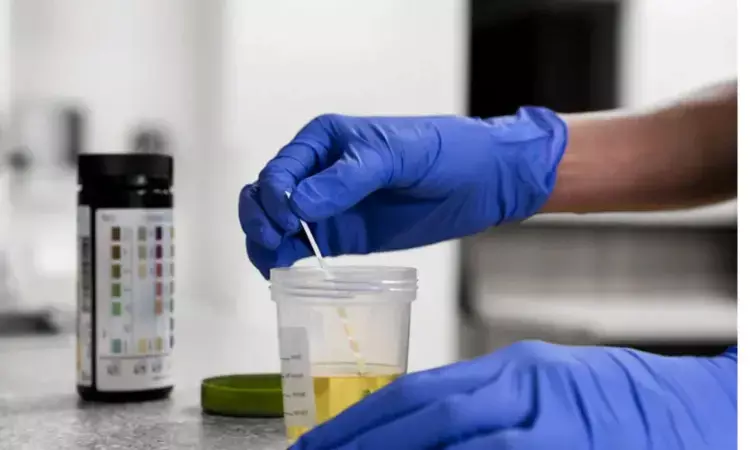- Home
- Medical news & Guidelines
- Anesthesiology
- Cardiology and CTVS
- Critical Care
- Dentistry
- Dermatology
- Diabetes and Endocrinology
- ENT
- Gastroenterology
- Medicine
- Nephrology
- Neurology
- Obstretics-Gynaecology
- Oncology
- Ophthalmology
- Orthopaedics
- Pediatrics-Neonatology
- Psychiatry
- Pulmonology
- Radiology
- Surgery
- Urology
- Laboratory Medicine
- Diet
- Nursing
- Paramedical
- Physiotherapy
- Health news
- Fact Check
- Bone Health Fact Check
- Brain Health Fact Check
- Cancer Related Fact Check
- Child Care Fact Check
- Dental and oral health fact check
- Diabetes and metabolic health fact check
- Diet and Nutrition Fact Check
- Eye and ENT Care Fact Check
- Fitness fact check
- Gut health fact check
- Heart health fact check
- Kidney health fact check
- Medical education fact check
- Men's health fact check
- Respiratory fact check
- Skin and hair care fact check
- Vaccine and Immunization fact check
- Women's health fact check
- AYUSH
- State News
- Andaman and Nicobar Islands
- Andhra Pradesh
- Arunachal Pradesh
- Assam
- Bihar
- Chandigarh
- Chattisgarh
- Dadra and Nagar Haveli
- Daman and Diu
- Delhi
- Goa
- Gujarat
- Haryana
- Himachal Pradesh
- Jammu & Kashmir
- Jharkhand
- Karnataka
- Kerala
- Ladakh
- Lakshadweep
- Madhya Pradesh
- Maharashtra
- Manipur
- Meghalaya
- Mizoram
- Nagaland
- Odisha
- Puducherry
- Punjab
- Rajasthan
- Sikkim
- Tamil Nadu
- Telangana
- Tripura
- Uttar Pradesh
- Uttrakhand
- West Bengal
- Medical Education
- Industry
Diabetes patients taking SGLT2 inhibitors may exhibit false positive urine ethanol tests: NEJM

USA: A recent article published in the New England Journal of Medicine described a patient with diabetes who was taking empagliflozin, an SGLT2 inhibitor, showing false-positive screening tests for ethanol in a room-temperature sample. This was due to bacterial fermentation of glucose that yielded ethanol.
Despite not ingesting alcohol for over 10 months, the man in his early 60s tested positive in his urine for ethanol on the last four urine samples he provided to a probation office. None of the urine samples contained any traces of illicit or non-prescribed substances.
But after he called his primary care provider for fear of going to jail over the positive tests, the PCP's lab revealed no detectable ethanol in a new urine sample, Aaron L. Schwartz, MD, PhD, of the Corporal Michael J. Crescenz Department of Veterans Affairs Medical Center in Philadelphia, detailed in the case study.
On the repeat urine test, they did not find ethanol, but the primary care lab did find the presence of glycosuria -- an expected finding as the patient was newly prescribed 20 mg daily of empagliflozin (Jardiance) just 5 months prior for his diabetes.
Schwartz called the city probation office to ask about their storage of urine samples. He was told that urine samples were samples were sent once daily to an external laboratory to be tested, but samples were not refrigerated before transport.
To test the theory, the primary care office took their new urine sample out of refrigeration. One day later the urine was retested for ethanol after it remained at room temperature for 24 hours. Now, the sample tested positive for ethanol.
He explained how the SGLT2 inhibitor drugs produce glycosuria even when blood glucose levels are within the normal range and also increase the presence of microbes in the urinary tract -- two ingredients needed for microbial fermentation.
Following the positive ethanol tests at the city probation centre, the urine sample collected by the primary care facility 3 days later had a glucose level of 1,000 mg/dL. It was negative for urinary ethyl glucuronide, urinary ethanol, nitrites, leukocyte esterase, blood, ketones, and bilirubin. A urine culture showed less than 50,000 CFU/mL of mixed gram-positive organisms.
According to Schwartz, since the class of SGLT2 inhibitors is frequently prescribed for a wide range of diabetes, kidney, and cardiovascular indications, this could have the potential to affect a lot of patients. The SGLT2 inhibitors include canagliflozin (Invokana), dapagliflozin (Farxiga), and ertugliflozin (Steglatro).
Given the potential for false positive results, he recommended that he would encourage clinicians to be mindful of whether a patient is subject to urine toxicology testing when taking this medication. A clinician should be somewhat sceptical of positive tests in these situations.
To conclude, SGLT2 inhibitors like empagliflozin are effective in diabetes management but can lead to unexpected test results. As science continues to evolve, so does understanding of these complex interactions. By staying vigilant and informed, patients and healthcare providers can navigate these challenges and ensure optimal diabetes management.
Reference:
Schwartz AL "SGLT2 inhibitors and false positive toxicology tests" N Engl J Med 2024; DOI: 10.1056/NEJMc2313463.
Dr Kamal Kant Kohli-MBBS, DTCD- a chest specialist with more than 30 years of practice and a flair for writing clinical articles, Dr Kamal Kant Kohli joined Medical Dialogues as a Chief Editor of Medical News. Besides writing articles, as an editor, he proofreads and verifies all the medical content published on Medical Dialogues including those coming from journals, studies,medical conferences,guidelines etc. Email: drkohli@medicaldialogues.in. Contact no. 011-43720751


